In the world of food, bloggers and influencers have taken on a new role. With the rise of social media, food bloggers and influencers have become some of the most powerful voices in the industry. From promoting products to creating recipes, they are helping to shape the way we think about food and how it’s produced. But, yes, there is a but! If a food influencer gives a negative report about a food brand, then it can end up rescinding the brand’s image. In this article, we’ll explore how food creators and influencers impact the food industry.
The entanglement of food influencers in the food and beverage industry
Food influencers and bloggers are individuals who create content on food and nutrition, critiquing food items, creating recipes, crafting articles, and sharing videos online. They often collaborate with businesses to endorse their offerings. With vast audiences on social media, these influencers have significant sway over food trends and consumer perceptions. They can shape people’s food choices, influence decisions on buying, cooking, and visiting restaurants, and create trends in the food industry like plant-based diets, veganism, and gluten-free eating. They have also significantly impacted food marketing, with companies increasingly partnering with food creators and influencers to promote their products and services, leading to increased sponsored content across various platforms.
Partnering with food bloggers and influencers can significantly benefit food companies by increasing brand visibility, reaching a wider audience, and fostering trust and loyalty among customers. They can also help create innovative products by providing valuable feedback and insights. These influential figures shape consumer perceptions and drive consumer choices, making their endorsements of products and services beneficial. Partnering with these creators offers a strategic way for businesses to expand their presence and build lasting relationships with their audience.
The Impact of Food Influencers on Consumer Behaviour and Marketing Strategies
Food influencers significantly influence consumer perceptions and purchasing decisions in the digital age. They can influence brand awareness and purchase decisions through social media posts, tweets, and stories. With a single endorsement, they can steer consumer behaviour towards specific food brands, products, or dietary trends. The potency of food influencer marketing lies in the authenticity and trust they can establish with their audience. In an era where consumers are skeptical of traditional advertising, they place greater trust in recommendations from relatable individuals, even if they are online personalities they haven’t met.
Food influencer marketing is a powerful strategy for businesses to engage with their target audience and align with their brand values. By partnering with influencers with a strong presence, businesses can enhance the effectiveness of their marketing messages in the digital landscape. Social media platforms like Instagram, TikTok, and YouTube have played a significant role in the growth of food influencer marketing. Influencers use innovative strategies like sharing food brand information, hosting cooking demonstrations, conducting food challenges, and posting restaurant reviews to engage their audience and motivate them to act on their recommendations.
Food influencer marketing is accessible to businesses of all sizes, including large corporations, small startups, and local food shops. E-commerce platforms have boosted their impact, making it easier for entrepreneurs to launch their businesses.
This strategy can reach a wider audience, enhance brand recognition, drive sales, and foster customer engagement. As the food industry grows, the potential of influencers is expected to become even more significant in the future.
Embracing food influencer marketing presents a compelling avenue for businesses to thrive and hence presents a plethora of advantages for the food industry, such as:
1. Amplified Brand Visibility: Food influencers boast sizable and engaged audiences fascinated by F&B ventures. Partnering with influencers exposes your brand to this receptive audience, heightening brand recognition and connecting with potential clientele.
2. Boosted Sales Performance: Food influencers possess the power to influence consumer purchasing decisions. Their endorsements, coupled with clear directions on accessing your business, can drive traffic to your eCommerce platforms, resulting in heightened sales and revenue generation.
3. Enhanced Credibility and Trustworthiness: Influencer’s command significant trust among their followers, making their recommendations highly credible. Teaming up with influencers who resonate with your brand ethos can elevate your credibility and foster trust within your target demographic. This advantage is especially valuable for emerging F&B enterprises, as they can leverage the influencer’s established credibility.
4. Stimulated Product Innovation: Food influencers are well-versed in emerging food trends and can offer invaluable feedback for product enhancement and innovation. Collaborating with influencers provides businesses with insights into consumer preferences. For instance, in the event of a viral food challenge, influencers can offer guidance on effectively incorporating it into your business strategy.
5. Genuine Relationship Building: Partnering with food influencers enables businesses to forge authentic connections with their target audience. Influencers excel at crafting authentic and relatable content, unbound by rigid corporate constraints. By aligning with influencers, your company can showcase its human side, cultivating meaningful customer relationships.
Challenges and Opportunities for Food Businesses
Social media platforms like Instagram, Facebook, and YouTube provide food businesses with unprecedented visibility, allowing them to gain stardom through popular influencer posts or positive reviews. However, this visibility also comes with increased scrutiny and the risk of negative reviews, which can damage a food product’s reputation.
Businesses must be prepared to manage their online reputation meticulously, respond to negative reviews diplomatically, take constructive criticism seriously, and be prepared to face lasting impacts from well-followed food influencers.
Critical assessments from food influencers can wield substantial influence over the food industry, potentially detrimentally impacting the sales of specific food items. Take, for instance, the Bournvita debacle involving influencer Revant Himatsingka, also known as Food Pharmer. Through his Instagram reel, he publicly criticized the company for purportedly promoting questionable health benefits of Bournvita. Following the reel’s exposure to 12 million viewers, Mondelēz resorted to legal measures, prompting the removal of the content.
The removal of a controversial video reel from a children’s powdered drink campaign sparked widespread debates about its healthfulness. The controversy led to a directive from FSSAI advising e-commerce platforms not to classify Bournvita and similar beverages as health drinks, causing significant damage to the product’s reputation.
So even a slight negative review by a food influencer for a food product can have big repercussions, like:
1. Reputation Damage: Negative reviews can tarnish the reputation of a restaurant, food product, or brand. Influencers often have large followings, and their opinions carry weight with their audience. A negative review can spread quickly through social media channels, leading to a decline in customer trust and loyalty.
2. Decreased Sales: Poor reviews can directly impact sales and revenue. Consumers may be deterred from trying a restaurant or purchasing a product if it receives negative feedback from a trusted influencer. This can result in a loss of business and financial setbacks for the food industry.
3. Loss of Credibility: A negative review from a reputable influencer can damage the credibility of a restaurant or brand. Consumers may question the quality and authenticity of the food, leading to a loss of credibility and authority within the industry.
4. Damage to Brand Image: Negative reviews can damage the overall brand image and identity. Brands work hard to cultivate a positive image and reputation, and a negative review can undermine these efforts, leading to long-term damage to the brand’s perception in the eyes of consumers.
5. Impact on Partnerships and Collaborations: Food influencers often collaborate with restaurants and food brands on sponsored content and partnerships. A negative review can strain these relationships and deter other influencers from wanting to work with the brand in the future.
The top 10 food influencers in India
In the era of digital connectivity, platforms such as Instagram and YouTube have emerged as epicenters of food promotions and brand publicity. Here, food influencer chefs congregate to explore tantalizing dishes, inventive recipes, and the freshest culinary movements. And since their connectivity with consumers has become so intense, food companies are associating with them to promote their brands.
Indian food influencers are excelling at encapsulating the essence of food through compelling visuals, immersive storytelling, and a deep comprehension of their audience’s culinary preferences.
After extensive study and review, we bring to the Top 6 Food Influencers in India” according to the number of followers they have. Of course, their food expertise has gained them a substantial online following. Food brands collaborating with these food influencers have had a flavorful touch in their marketing strategies.
Below list is based on Instagram/YouTube followers in descending order
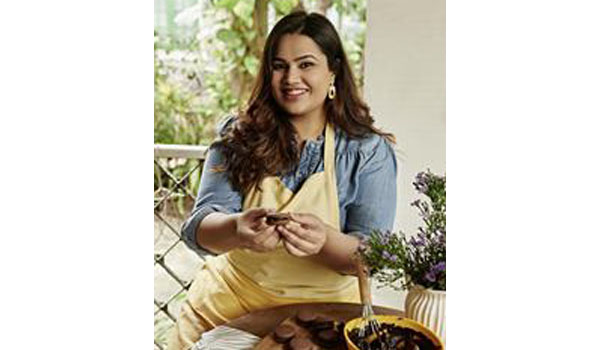
POOJA DHINGRA
Pooja Dhingra is an Instagram sensation with an astounding 7.1 million followers. Recognized as the “Macaron Queen of India,” Pooja has not only achieved culinary fame but has also become a trailblazer in the world of desserts. Her journey from the modest confines of her home kitchen to international acclaim speaks volumes about her relentless commitment and unmatched creativity in the craft of pastry-making.
From intricately piped macarons to towering confectionary works of art, Pooja’s creations transcend mere desserts, embodying artistry, grace, and, above all, a deep affection for her craft. Yet, her influence extends beyond the kitchen; she serves as a beacon of inspiration for aspiring chefs and dessert enthusiasts alike, igniting fervour for baking and innovation across the globe.
A food influencer marked by constant evolution, Pooja Dhingra emerges as a symbol of innovation and excellence, reshaping our perception and experience of desserts in profound ways.

VIKAS KHANNA
Vikas Khanna emerges as one of the top influencers, with around 5 million followers. He is a Michelin-starred chef, an author, a filmmaker, and a philanthropist. His remarkable journey from a modest Indian town to global recognition stands as a testament to his exceptional talent, fervent dedication, and unyielding perseverance.
Many draw inspiration from Vikas Khanna’s odyssey, from overcoming physical challenges to ascending to the pinnacle of the culinary realm. His philanthropic endeavours and steadfast commitment to showcasing the diverse flavours of Indian cuisine on a global stage underscore his identity not only as a skilled chef but also as a compassionate humanitarian, reshaping culinary boundaries as a maestro.
Vikas Khanna can be labelled as one of the country’s leading food influencers. Based in New York City, it boasts a prestigious Michelin star. He has delighted the palates of celebrities and dignitaries such as Barack Obama, His Holiness the 14th Dalai Lama, and Narendra Modi. Beyond his culinary prowess, Khanna is a prolific writer, filmmaker, humanitarian, reality TV judge, and restaurateur.
In fact, in the last couple of years, Khanna has increasingly been on the list of companies looking to engage him for their brands. Earlier this year, he was signed up by the American multinational PepsiCo’s Quaker Oats as the nutrition ambassador for the brand. Last year, Domino’s Pizza, run by Jubilant FoodWorks Ltd., inked a deal with him to introduce gourmet European-style pizzas and snacks. That is not all.
Khanna was also signed up by seafood producer Gadre Marine Exports as the face of its brand. Gadre processes and packages frozen marine products such as shrimp, squid, and cuttlefish.
He is also actively involved in promoting millets and has emphasized the pressing need for educating people about millet infusion in cuisine and making it mainstream.

RANVEER BRAR
Chef Ranveer Brar, our second Indian food influencer on the list, whose culinary journey weaves together tradition, innovation, and unwavering dedication, has an impressive Instagram following of 3.3 million. Chef Brar transcends the title of mere chef to become a culinary sensation in his own right.
Hailing from Lucknow, at the age of 17, Brar chose to pursue a career in the culinary arts, guided by the esteemed Ustad Munir Ahmed, a revered kebab vendor in Lucknow. Under Ahmed’s mentorship, Brar explored deep into the time-honoured techniques and traditions of Indian cuisine, discovering his true calling amidst sizzling grills and fragrant spice blends.
Armed with knowledge and ambition, Brar used his cooking skills at prestigious hotel chains like the Taj Group and Radisson. And as his reputation grew, Brar’s culinary prowess captured the attention of international audiences, leading to opportunities to showcase Indian cuisine on a global stage. He now has restaurants in Boston and also collaborates with renowned hospitality groups.
In 2016, Brar unveiled his autobiography, “Come Into My Kitchen,” offering readers insight into his culinary odyssey. The following year, he shared his expertise once again with the release of “A Traditional Twist,” a recipe book blending innovative yet traditional culinary inspirations.
He also has the honour of preparing a meal for former Indian Prime Minister Atal Bihari Vajpayee.
MasterChow, a ready-to-cook Asian staple brand, has joined forces with celebrity chef Ranveer Brar as its brand ambassador. This collaboration aims to establish MasterChow as the ultimate destination for authentic Chinese cuisine, emphasizing trust, credibility, and reliability. MasterChow’s decision to team up with Chef Ranveer Brar underscores their shared commitment to authenticity and quality.
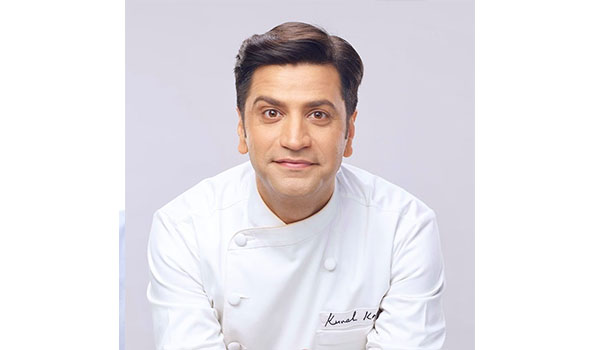
KUNAL KAPOOR
Chef Kunal Kapur is a renowned chef and media personality, originating from New Delhi, and has an impressive Instagram following of 3.2 million. Chef Kapur has firmly established himself as one of India’s foremost culinary influencers.
Fuelled by the love for cooking instilled by his father and grandfather, Kapur discovered his passion for the culinary arts at a young age. Trained at the prestigious Institute of Hotel Management in Chandigarh, Kapur refined his culinary skills while working with renowned hotel chains like the Taj Group and The Leela. His journey took a significant turn when he entered the television industry, hosting and judging popular shows such as MasterChef India and Junior MasterChef India.
Kapur has two fine dining establishments, Pincode and Quarter Plate, that offer a distinctive dining experience.
From crafting millet-based meals for prestigious events like the G20 Summit to championing healthy cooking through his cookbook, “Kunal Kapur in the Kitchen,” he consistently pushes culinary boundaries.
Recognized for his significant contributions to Indian cuisine, Kapur has received numerous awards and accolades from esteemed organizations such as the Indian Television Academy and India Today magazine. Beyond the kitchen, he actively promotes healthy cooking, mentors underprivileged youth, and shares his culinary adventures through travel and food shows.
Celebrity chef and restaurateur Kunal Kapur is the face of Stemlit Growers, owned by fresh fruit importer IG International. Kapur has been signed for a year to endorse the brand and also spread awareness regarding the quality and freshness of Stemlit’s products. He also played an integral role in creating Indian and Chinese flavours for Saffola masala oats.

MEGHNA KAMDAR
Let’s shine a spotlight on Meghna Kamdar, whose culinary prowess and infectious enthusiasm have earned her a dedicated following of 2.3 million on Instagram.
Meghna Kamdar, once a banker grappling with depression and the weight of societal expectations, found her calling as a star baker and social media influencer.
Through her engaging tutorials and relatable storytelling, she has not only transformed her own life but has also inspired millions to embrace their passions and pursue their dreams.
Today, as a celebrated food influencer with a massive following, with each recipe shared and each story told, Kamdar leaves an indelible mark on the hearts and minds of her audience, embodying the belief that it’s never too late to reinvent oneself and chase one’s dreams.
Chef Meghna also runs her own YouTube channel, ‘Meghna’s Food Magic’. She has also been part of various campaigns for Saffola, TATA Housing, Signature, Daniel Wellington, Cadburys, The Westin, Dr. Oetker, and ITC Sunfeast, to name a few.
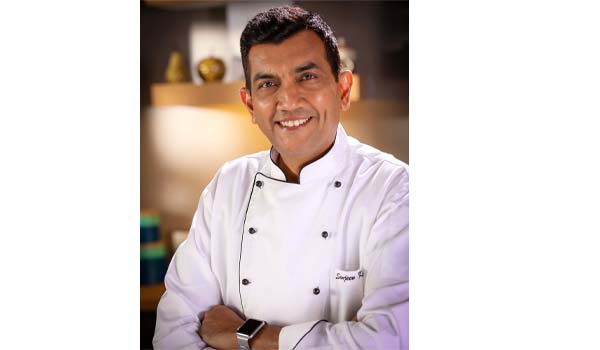
SANJEEV KAPOOR
Chef Sanjeev Kapoor, a Padma Shri Awardee, is renowned globally as a culinary icon. Every child and adult from the 90s would have watched his path-breaking, longest-running cookery show in Asia, ‘Khana Khazana’. With his constant smile while cooking and his famous dialogue, ‘Namak Swad Anusar’.
Chef Kapoor has not only excelled in the culinary world but has also been an empowered food influencer and food enthusiast through his numerous ventures. www.sanjeevkapoor.com is Sanjeev Kapoor’s portal, which is a complete cookery manual with a compendium of more than 15,000 tried and tested recipes and a wealth of food-related information.
A fan page on Facebook, started in 2009, has over 8.8 million fans and is growing. Another popular initiative is Sanjeevkapoorkhazana, a channel on YouTube; it has over 7.4 million subscribers and over 1.5 billion video views. His Twitter handle, ‘@sanjeevkapoor’, is one of the most sought-after food handles, with 2.1 million followers. His Instagram handle, with over 1.8 million followers, is a visual treat that will leave you salivating for more.
His popularity and contribution to Indian cuisine have been recognized by the Government of India too, which conferred on him the national award of ‘Best Chef of India’. He is also on the board of the Singapore Airlines International Culinary Panel, along with the brightest names from the culinary world across the global culinary capitals. He divides his time between India and abroad by doing live food events and cooking demonstrations, for which he is always in great demand.
A confessed gadget freak, Sanjeev channelled his love for technology to create ‘Wonderchef’, a premier cookware and kitchen appliances brand; he is also the co-founder of Tiny Chef, a company working on culinary AI and ML; and he has launched his online academy, sanjeevkapooracademy.com.
Today, he is in demand for many brands as a brand ambassador for their products. He has endorsed brands like Zydus Cadila’s Sugar-Free, Nutralite, Daawat Basmati Rice, Tata Sampann Dals, and Masalas. As a restaurateur, he has granted his franchise to several restaurants both in India and abroad. Khazana and The Yellow Chilli are popular names today, and now with his company SKR (Sanjeev Kapoor Restaurants), he is extending these brands by adding Signature, Sura Vie, Indi, and many more brands under different categories.
The licensing and merchandising vertical SK Brands under the brand SANJEEV KAPOOR—Premium Houseware and Premium Kitchenware—offers a range of products, from steel ware and glassware to ceramic ware and much more. In addition to the endorsement of brands, he is also engaged in collaborative ventures with brands such as Big Basket, Fast and Up’s Goodeatz, and ProV Foods.
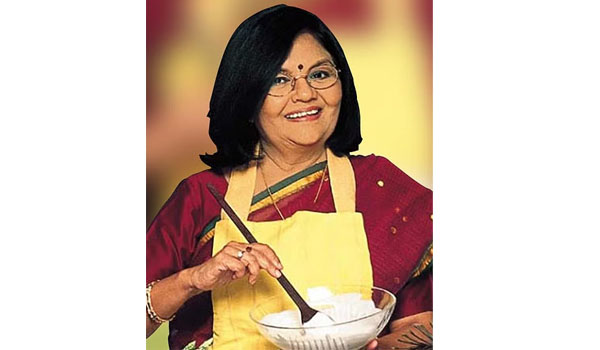
TARLA DALAL
Tarla Dalal, a culinary icon and pioneer in the world of Indian cooking, left an indelible mark on the food with her passion for vegetarian cuisine and innovative recipes. Her Instagram profile is handled by her son and has about 1.1 million followers.
Her culinary journey began in 1966, when she started conducting cooking classes from her home. This eventually led to the publication of her seminal work, “The Pleasures of Vegetarian Cooking,” in 1974, which sold over 1.5 million copies and catapulted her to culinary stardom.
Tarla Dalal is credited with introducing and popularizing foreign cuisines to Indian audiences, often creating vegetarian versions of non-vegetarian dishes from around the world. Her innovative approach to cooking revolutionized the industry, making her the bestselling cookbook author in India.
Her influence extended beyond borders, with her books translated into multiple languages and her cooking magazines gaining widespread acclaim. In 2007, she launched her ‘Total Health Series’ cookbook series, highlighting her commitment to healthy cooking.
While she explored various cuisines, Tarla Dalal specialized in vegetarian Indian cuisine, particularly Gujarati cuisine. Her contributions to the culinary world were recognized with numerous accolades, including the prestigious Padma Shri Award in 2007, making her the only Indian woman in the cooking field to receive this honour. Additionally, she was honoured as Woman of the Year by the Indian Merchants’ Chamber in 2005.
Apart from writing cookbooks, Dalal had launched a line of ready-to-cook mixes, which was acquired in 2000 by a company named International Bestfoods Ltd. Her list of entrepreneurial ventures also includes Tarla Dalal vegetarian restaurants like Namah in Pune, which serve food made from her recipes. She also hosted a show, ‘Cook it Up with Tarla Dalal’, which was telecast on Sony TV.
The show ran over a period of three years and gained phenomenal success. For her outstanding contribution to the field of cooking, she was awarded the Padma Shri in 2007. The published cookbook author, chef, and entrepreneur passed away in November 2013. Tarla Dalal was, for sure, one of the most celebrated cooking stars in India and has left behind a rich legacy.
Food influencers like Tarla Dalal, Sanjeev Kapoor, and Vikas Khanna, among others, have made Indian cuisine exciting and also introduced people in India to global cuisines. They are stars who have taught their followers to cook as well as helped in promoting food brands in an international scenario. Their cookery shows, recipe books, lectures, and articles have made it possible to prepare restaurant-standard dishes at home and have helped people make choices about what brands they should buy.
Why is the food industry still skeptical about food influencer?
Food influencers offer numerous opportunities in the D2C food sector, but companies’ perceptions vary based on their growth stage. Aweri Foods, a D2C startup, uses social media content to gather feedback, but is open to collaborating with influencers to expand their reach. Established FMCG companies express reservations about the effectiveness of influencers, and some authentic food influencers abstain from brand partnerships to maintain their credibility. Despite the abundance of influencers on platforms like Instagram, the need for effective collaboration remains a challenge.
Revant Himatsingka, a former McKinsey consultant, embarked on creating concise videos to enlighten individuals about the concerning levels of certain ingredients found in food packaging labels. After nine months, the 31-year-old, now widely recognized as Foodpharmer, is credited with significantly influencing Bournvita’s revised packaging label, which displays reduced sugar content. With a staggering 1.2 million Instagram followers, the Kolkata native has yet to engage in any brand partnerships.
While Foodpharmer enlightens individuals about the packaged foods they consume daily, Krish Ashok endeavors to dispel common myths and concerns. Despite his substantial digital presence, Ashok, a technology professional, culinary author, and musician, refrains from pursuing brand collaborations. “Associating ‘Sponsored by’ with a video aimed at debunking myths would immediately undermine its credibility,” he notes. Ashok expresses less concern about monetizing his online presence than he does about the transformation of cooking documentation in the realm of short-video formats.
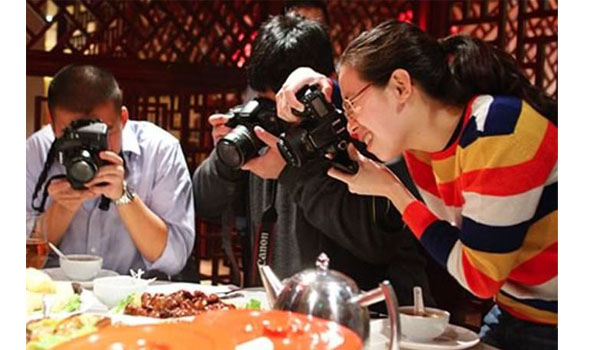
Analyzing the Proliferation of Food Influencers
The food influencing industry has diverse niches, from village cooking to gourmet baking, but demands have not grown proportionately. Short-video formats are reshaping online culinary documentation, putting pressure on food influencers to maintain visibility online. While brand launches require collaboration with influencers for content creation, monetary growth hasn’t matched the expanding market. Mega influencers with over 1 million followers secure long-term collaborations and substantial earnings, while nano influencers face limited monetization options and often rely on online reviews or limited brand collaborations.
Despite the widespread popularity of producing food content online, many creators struggle to turn it into a lucrative venture. However, some have found success by specializing in hyperlocal content, focusing on specific regions or cities. Take, for instance, Lakshmi Vignesh M from Erode, Tamil Nadu, and Raina Wangkheirakpam from Imphal, Manipur, who have become influential figures within their respective locales.

Suresh Pillai stands out as an example of a regional influencer who has surpassed industry norms, using his social media presence to achieve remarkable entrepreneurial accomplishments. According to Qoruz, an influencer data analytics firm, creators in the food niche can thrive by honing in on hyperlocal content and establishing themselves as authoritative voices within their city or region.
Though challenges persist, creators like Renu Dalal remain optimistic about monetizing their digital presence. Food content creation offers long-term viability, with videos providing opportunities for repeat views and advertising revenue, attracting a diverse audience, including diaspora communities.
The money matters
The food influencing industry has grown significantly, with content creators ranging from rustic village cooking to gourmet baking. However, the financial rewards have not kept up with the industry’s growth. The rise of short-video formats has made it challenging for foodfluencers to maintain their online visibility, often surpassing the stress in the kitchen. Greenroom Network, an influencer marketing agency, reports that while demand for food-related content is high, monetary returns have not seen exponential growth. The saturated food content space makes it difficult for individual creators to stand out.
Top food influencers earn substantial fees for their content, while celebrity chefs earn less. Mega influencers with over a million followers can secure long-term collaborations and potentially significant annual income through video partnerships and reality shows. Nano influencers with smaller followings have limited monetization options, often relying on online reviews on food aggregator apps. Regional influencers may secure modest compensations for brand collaborations and additional income from multiple brands deals each month.
Editors’ Insight
Social media marketing has become crucial in various sectors, including the food industry, as consumers increasingly rely on it for recommendations. Influencers play a significant role in shaping consumer opinions and influencing purchasing behaviour. Studies suggest that social media is reshaping our relationship with food, influencing our perceptions of what we eat. Our food choices are often influenced by our social circles, with regular posts about certain foods prompting us to emulate their choices.
Food and beverage trends, such as kale, coconut water, spiralized vegetables, kombucha, and Bhutanese chilli cheese, started with celebrities who talked about them on social media. However, not all trends are kicked off by social media stars. Macro-influencers, who gather around 100,000 followers on social media based on their passion for food, can influence trends equally well. Micro-influencers, often unpaid creators with 5,000 to 25,000 fans, can be crucial in establishing trends and convincing their friends based on their authenticity and proximity.
The success of any influencer marketing endeavour hinges on the careful selection of the right creator. Brands can either forge a long-term partnership with a renowned celebrity, collaborate with a well-known chef, or orchestrate a campaign with numerous micro-influencers. The visual nature of food content necessitates choosing influencers with the requisite video or photo production skills and equipment. Alternatively, brands can provide support in the form of digital or physical assets, enabling creators to present their products in the most appealing manner possible.
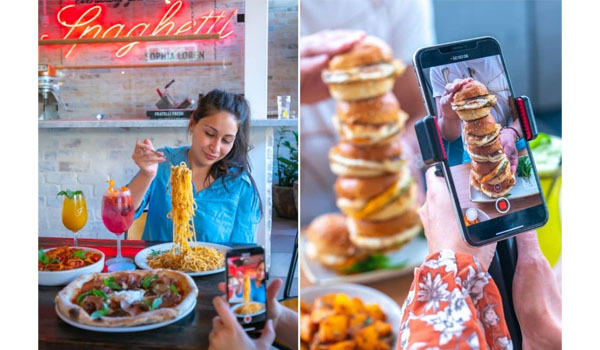
FMCG brands are embracing this trend by adjusting their packaging to resonate with consumers’ visual preferences online. For example, Lay’s Potato Chips, owned by PepsiCo, showcases packaging designed to appeal to Instagram users.
Kraft leveraged influencer marketing to enhance brand awareness and favourability online, collaborating with both Micro and Macro influencers to promote their cheese products. In India, FMCG firms like Hindustan Unilever Ltd, Nestle, and PepsiCo have actively started collaborating with influencers for various brands categories, focusing on social advertising and user-generated content to boost engagement and brand awareness.


